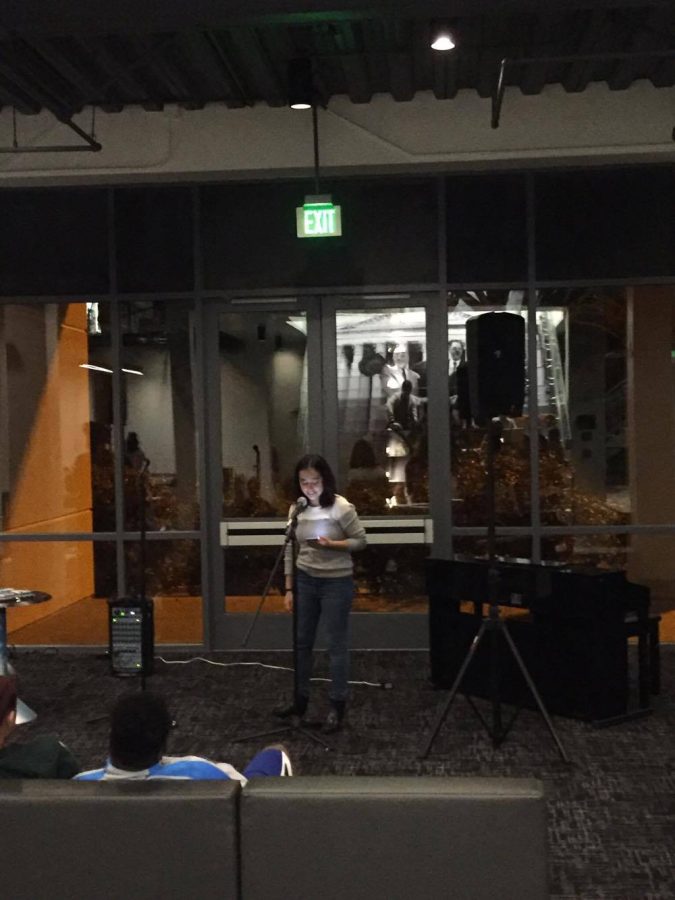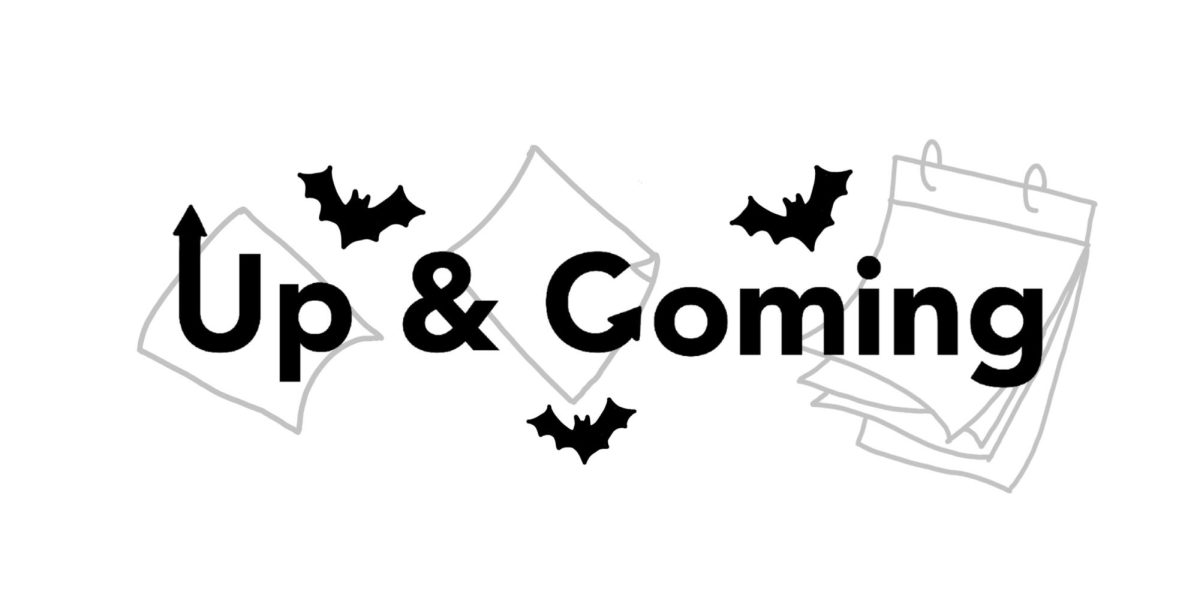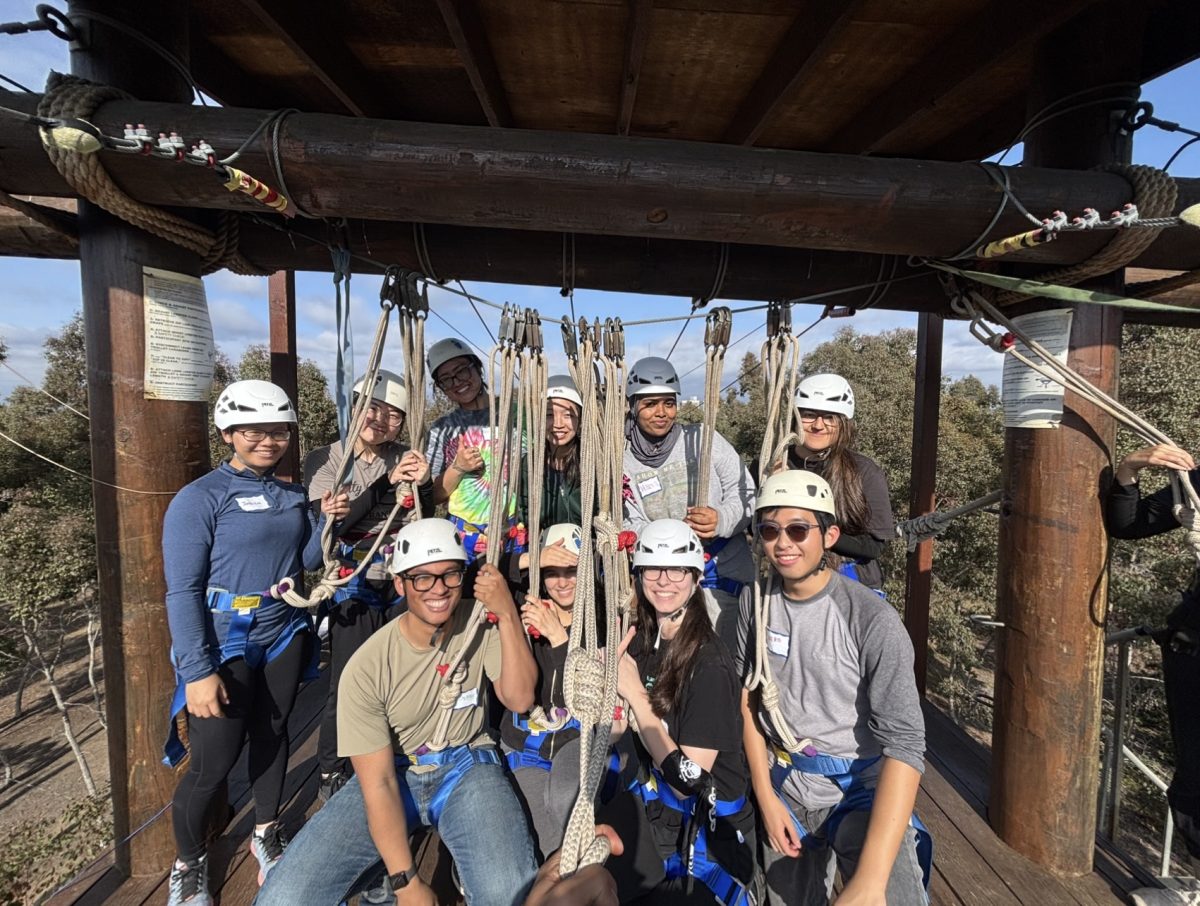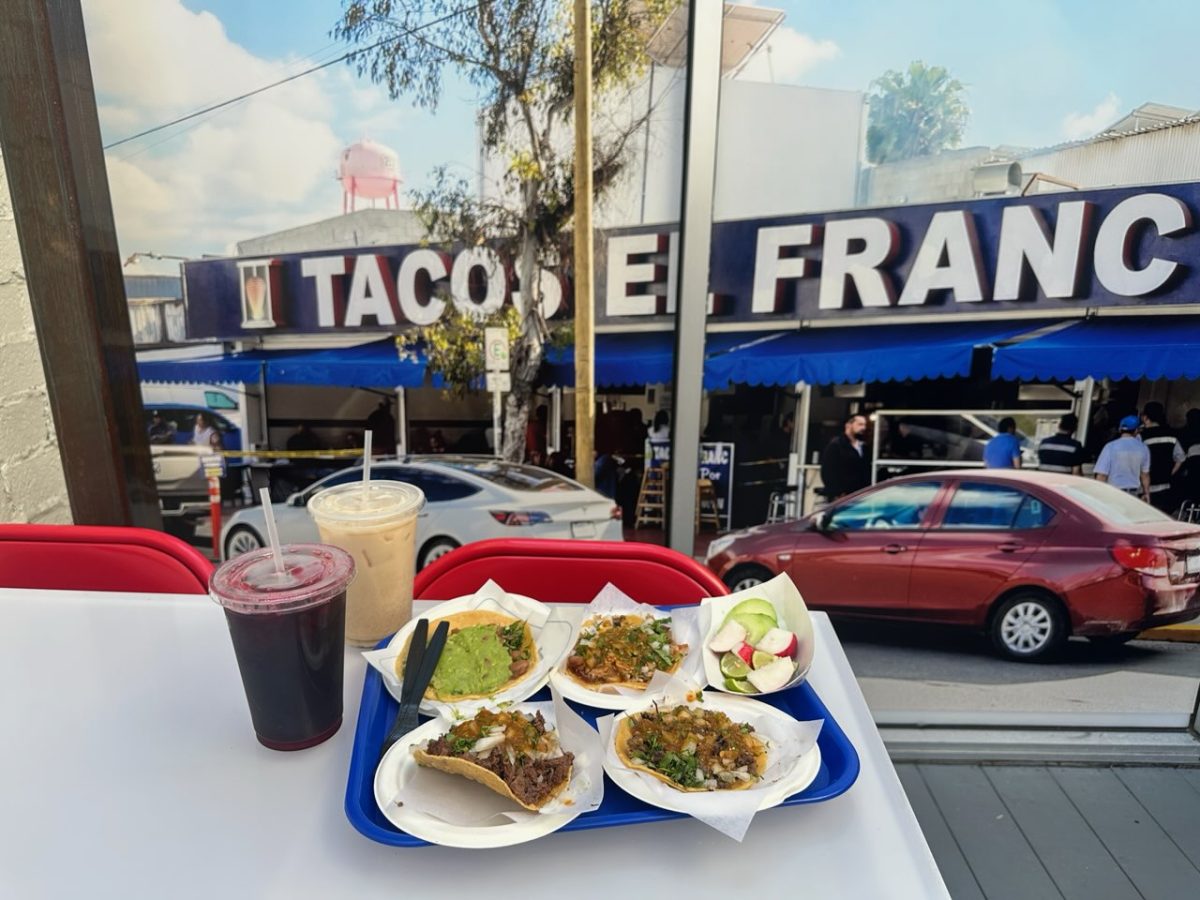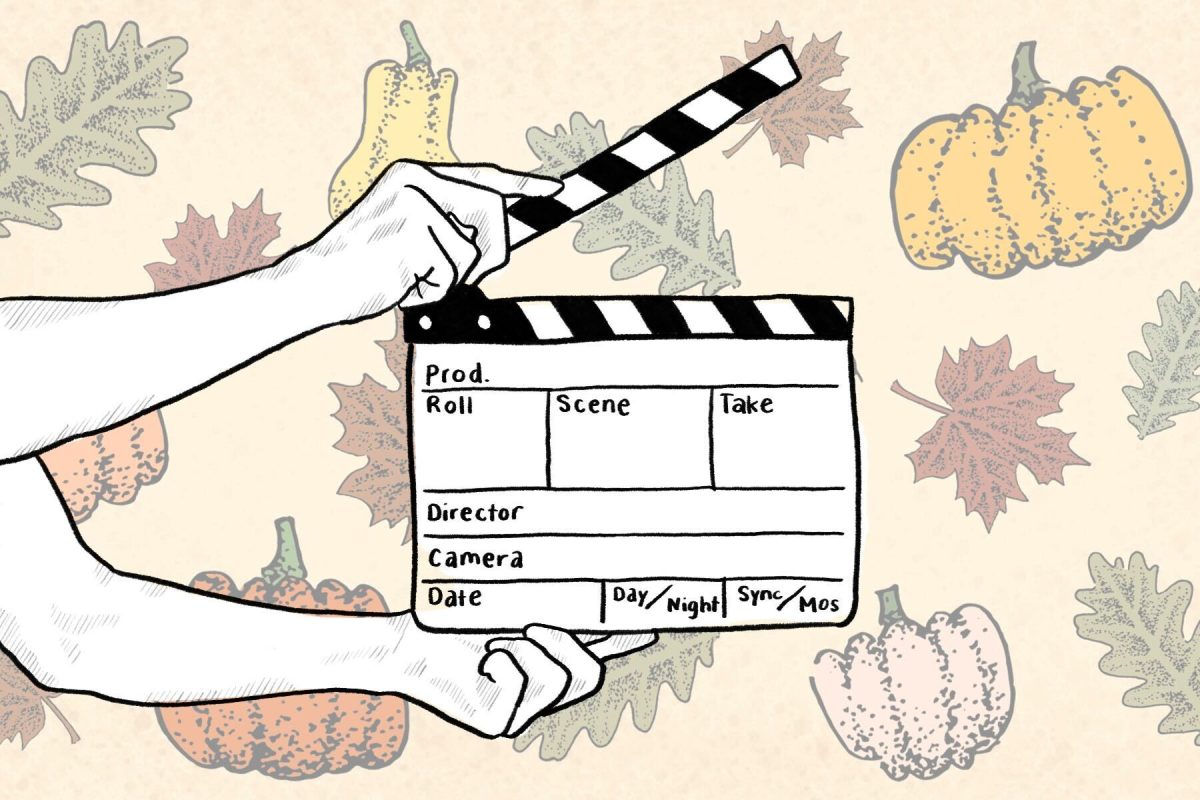Student Poets Break the Silence // written by: Annika Olives, Lifestyle Co-Editor
Thurgood Marshall College sophomore Maria Omelchenko found her knack for poetry in elementary school.
“I think back in the fourth grade, I don’t know if you guys had this, but we had a student-of-the-month thing, and everyone got a student of the month award, and mine was like, ‘Oh, you’re a really good writer,’” Omelchenko said. “So I kind of just started to dabble with writing and dabble with poetry.”
In high school, she discovered her love for spoken word. “When my friends started a club, I started going to that club, and then I kind of fell in love with [spoken word] from there,” Omelchenko said. “Just the emotion, the feeling, the power that you can actually hear people read words instead of just reading it on paper: It’s just a different feeling.”
So, when Omelchenko arrived at UC San Diego, she set out to join a spoken word club but quickly realized there were none.
“When I would go to my high school [spoken word] club, it was kind of like a getaway from everything else that was going on in life … it really brought a lot of people together, through the word, through how people express themselves, so when I came to college I was looking for a club like that, but I couldn’t find one,” Omelchenko said. “I couldn’t even find a poetry club, even, so I kind of decided to take matters into my own hands because I feel like I know a lot of people who do write, not even just spoken word but poetry in general, and I wanted to bring that to this campus because I was quite shocked that we didn’t have something like that, and we definitely need to promote the arts at this university.”
Thus, Omelchenko took to Facebook and found fellow poetry-lover and Muir College sophomore Leonardo Amador. They, along with a few other principal members, joined forces to create Break the Silence, UCSD’s first and only spoken word club.
Many young adults are drawn to poetry, specifically slam poetry, because the words give them power or allow a form of expression.
“I like the raw emotion that comes attached to [slam poetry]. A lot of slam is very personal, people writing about stuff that they struggle with, their inner demons,” Amador said.
“It’s a good way to cope, I feel, because a lot of the time when it comes to spoken word and when it comes to poetry in general, not often do you hear people read or perform poetry that’s necessarily happy,” Omelchenko said. “A lot of the time writing comes from very dark places in our hearts, so I feel like it’s a good way to release that energy because, definitely, when I sit down and write I’m in a certain state of mind.”
Through Break the Silence, Omelchenko hopes to establish a place on campus for both poets and nonpoets to share those emotions openly and freely. “My main purpose of the club, and this is pretty much said at every meeting, [is that] it’s a safe space,” she said. “So, whatever’s said in the club shouldn’t be publicly mentioned, no one should be discussed, and it should really be a safe space with no judgment for everyone to read what they want to read, even if it’s a haiku, even if it’s a short story, even if that’s not even poetry but they just want to go ahead and read a five-minute story, that’s fine too.”
Amador agrees. “I know one of our big goals is to make it a place that people come out and be who they want to be, be vulnerable and be able to tell people what they’re thinking or what they’re feeling,” he said.
Break the Silence meets every other Wednesday at 7 p.m. Its next meeting is on April 19 in Conference Room 300 in the Student Center. Visit its Facebook page for more information
Interviews
Leonardo Amador, second year, Muir, VP of BTS
- “I was first exposed to slam poetry my freshman year of high school because Torrance High had annual slam competitions … My first piece was actually about running, and then after that I’ve always been into it. I remember freshman year I was hearing these cool literary tricks or whatever and I was like wow that’s super cool. I mean I’m not really good at it, but I do like writing it. I really enjoy listening to it.”
- “I like the raw emotion that comes attached to [slam poetry]. A lot of slam is very personal, people writing about stuff that they struggle with, their inner demons and whatnot. So it’s admirable when people go up there and become vulnerable. They just open up and talk about something that’s bothering them. I also do like the happy poetry, too, which is I’d say more rare, but I like that people talk about their personal problems, like social issues, just stuff that means something to them.”
- “[Break the Silence] was actually Maria’s idea, because she’s the one that’s really into slam and whatnot. She did it, she was in a club in high school for it, and she told me that she was looking for a club that did that, and she couldn’t find one so she decided to start her own.”
- “I know one of our big goals is to make it a place that people come out and be who they want to be. Be vulnerable and be able to tell people what they’re thinking or what they’re feeling. Because it is scary, you know, and you never know how someone is going to react to you opening up. There’s always cases where people are super supportive but then there are some that are like, ‘I’d rather not listen to your problems.’ So what we want to do is create a space where people can write down stuff that would bother them and they can use it as a place to vent, a place to connect with people, because college is hard enough as is with classes and stuff, and having other people there to support you is very nice. And it’s super cool when I hear a piece and it’s exactly something I’ve been through, and I’m like, yes, I identify with that, or like I’m not alone. And I think that reassurance is very helpful for people.”
- “The environment we set is very casual. After a piece is read, people usually give feedback, like oh I like this piece because this, and I liked it because of that, or I connect on this because of this. There are times when we diverge from poetry for a bit for like five, ten minutes and we’ll just talk about the subject matter. Like if relationships come up, we’ll talk about that.”
- “A good amount of people are frightened at the idea of going up and speaking in front of people, especially those that they don’t know, so I feel like it’s not just an emotional release, but you also get practice speaking in front of people.”
- Wednesdays at 7 pm, twice a month, location TBA
Maria Omelchenko, second year, Marshall, P of BTS
- “I got started with spoken word back in high school when two of my friends started a club on campus but I was originally introduced to it back in sophomore year of high school when we had a spoken word unit … I’ve always wrote poetry, I’ve been writing poetry since the 5th grade I think. So when I got introduced to this, and when my friends started a club, and I started going to that club, and then I kinda fell in love with it from there. Just the emotion, the feeling, the power, that you can actually hear people read words instead of just reading it on paper, it’s just a different feeling.”
- “I think back in the 4th grade, I don’t know if you guys had this but we had a student of the month thing, and everyone got a student of the month award, and mine was like, ‘Oh, you’re a really good writer,’ and I was like ‘Oh, thank you.’ And so I kinda just started to dabble with writing and dabble with poetry, and I wrote short stories way back when, but my biggest issue was that I could never finish it because it would get too long and I would get kind of bored. So I started writing poetry because that I could finish in one sitting, and then I could just be done.”
- “Poetry is just the best way I find to express myself and to express what I feel inside. It’s a good way to cope, I feel like, because a lot of times when it comes to spoken word and when it comes to poetry in general, not often do you hear people read or perform poetry that’s necessarily happy. A lot of the times writing comes from very dark places in our hearts, so I feel like it’s a good way to not only release that energy because definitely when I sit down and write I’m in a certain state of mind … Also it’s a good way to relate. When I hear poetry or read poetry that I relate to it just makes me feel less alone in my struggles, and then I like to take quotes and put them on my wall.”
- “I got really inspired from my friends in high school who started this spoken word club, and when I came to college I really wanted to find the same environment. Because when I would go to my high school club, it was kind of like a getaway from everything else that was going on in life, and a lot of times people come and read really emotional and really personal poetry, and whenever the club was over we kinda came out a little down, not in a bad way but just like, that was intense, but a good intense. It really brought a lot of people together, through the word, through how people express themselves, so when I came to college I was looking for a club like that, but I couldn’t find one. I couldn’t even find a poetry club, even, so I kind of decided to take matters into my own hands, because I feel like I know a lot of people who do write, not even just spoken word but poetry in general and I wanted to bring that to this campus because I was quite shocked that we didn’t have something like that, and we definitely need to promote the arts at this university. It’s also a good way for people in college who maybe haven’t had the chance to read their writing, because a lot of people who do come to our club, they tell me I’ve never had the chance to read this, I’ve never had the opportunity to read this, and now it’s like, finally, they have this chance to read it and express themselves and express how they’re feeling about life in general.”
- “I think my main purpose of this club is how I felt with my club in high school, is like a getaway from whatever’s going on in our lives, especially because college is super stressful, not in just academics, but we’re in that period of life where a lot of things just happen, a lot of bad things, a lot of really emotional things, and I feel like at times in college you feel really distant because everyone kinda runs on their own schedule, so I feel like to have a place where you can come together and meet other people who are going through very similar situations, or very different situations, but they’re still with you, and I guess the feeling of pain or even happiness … But my main purpose of the club, and this is pretty much said at every meeting, it’s a safe space. So, whatever’s said in the club shouldn’t be publicly mentioned, no one should be discussed, and it should really be a safe space with no judgment for everyone to read what they want to read, even if it’s a haiku, even if it’s a short story, even if that’s not even poetry but they just want to go ahead and read a 5-minute story, that’s fine too. So there aren’t really any boundaries for the club.”
“One big thing about Break the Silence is that it is still a new club. We just got started, we got registered in fall and it’s small but hopefully with time I would love for it to grow, I would love for people who have never done spoken word or who have never done poetry [are] inspired by other people in the club to maybe try it out on their own. Because even though I’ve been writing for a while, I’ve never done spoken word until I heard it on a video, so maybe that will bring out someone to try it out. Because college is really about finding, this is so cliche, but finding yourself, discovering new talents and hobbies, and it’s like, if you were never exposed to it, how would you know if you’re good at it or not or if that’s something you want to do, especially because UCSD is so rigorous and so stressful, it’s a good escape from all of that to kind of relax, to really just say what you want to say.”
Muir Outspoken Speaks Out Loud // written by: Brittney Lu
Some work with parametric lines and planes, some with pages and paragraphs; both are capable of curating unique art forms that speak in multiple dimensions. For Muir College sophomore Henri Etel Skinner, the intersection of diverse community, contrasting academia, personal experience and inherent creativity drives her passion to create spaces where words can fall on a page from any author who wants to tell a story. In the midst of winter quarter blues, Skinner shares how it was through written words and creative thinking that helped her not only understand herself better, but explain that part of her identity to others too. And this past fall, she helped co-create Muir Outspoken, a gathering atop of Tioga Hall where writers of all skill levels and of all backgrounds congregate to compose.
“I’m so glad this space exists,” Skinner said. “It has not only provided a place for students to stop thinking about school [through] writing, but to get over the fear of not writing well … to stretch writing abilities, [and] to take the reality of our thoughts and lives — sometimes heartbreaking and sometimes silly — and putting it into words.” At an institution where students can operate on a cycle of learning, memorizing, retaining and disposing, Muir Outspoken is a space to take better, and perhaps a more holistic, ownership of what is learned both in and out of the lecture.
Since its origin fall quarter, Muir Outspoken has already seen its fair share of up-and-coming creative writers. In the process of developing more creative writers, Muir Outspoken has also cultivated a community where “people are [beginning] to understand each other through creative thoughts,” where students are more than “classes, jobs or an answer to a homework problem,” says Skinner. In this unique community, and perhaps divine space that stimulates a search for identity, group processing and cognitive creativity helps this band of scribes express themselves in ways that go beyond what is seen on resumes or quantified through GPAs.
In this space for creative writers and thinkers, artistic movers and shakers, Skinner hopes that each person will begin to retrospectively realize their individually-gifted “ability to think creatively.” For her, “creativity does not [solely] mean you can paint something well, write a sonnet within five minutes, or create an entire backstory for a meme economy presentation” — all of which have been byproducts of Muir Outspoken. Rather, Skinner believes that it is instead the ability to introspectively reflect and “tell a story no one else would be able to tell,” from whatever perspective one uniquely brings to the writing table. She concludes her own story with Muir Outspoken by inviting even more to join her tribe of troubadours, no matter how much writing experience one may have, or how “creative” one may perceive themselves. (Normalcy in creative thought is presumably only a consequence of social constructs, no? But I digress.) So she asks, “Does physiology leave you wondering about some wild biological scenario? Do you unashamedly want to work on math because you love the way numbers fall into place? Do you love the beauty of consistency in physics?” Because in the end, “that is all creativity.”
Her active pursuit to challenge and redefine what creativity looks like, coupled with her crusade for a community that is all-inclusive, yet heightens the individual experience, is iconically Henri Skinner — she lives through stanzas, perceives through poetry and sees a world where all are welcome to come and color it in. And through Muir Outspoken, this is exactly the sort of space where you are invited to do the same. So pick up a pencil and a few loose-leaf sheets and check out Muir Outspoken to hear some stories as you share your own.
Entanglements: Rae Armantrout Finds the Poetry in Physics // written by: Annika Olives, Lifestyle Co-Editor
Rae Armantrout is a versatile poet.
Armantrout was born in 1947 on a California naval base. She attended UC Berkeley and was part of the first generation of Language poets, an avant garde group that brought poetry to the postmodernist sphere. In 2010, she won the Pulitzer Prize with “Versed,” a book consisting of poems mainly relating to Armantrout’s battle with cancer.
The words she chooses in her work appear to look simple, but her ideas are profound. She is well-known within a field where not many are.
“Entanglements,” recently published, was inspired by Armantrout’s burgeoning interest in science. The title has two meanings: One is based on the idea that particles can become so entangled that there is virtually no space between them; the second is about Armantrout’s entanglement with physics itself.
Armantrout is currently a professor emerita at UC San Diego within the literature department. Join her on April 13 in the Atkinson Hall Auditorium as she reads poems from “Entanglements,” discusses the process behind her work and describes how she was able to combine science with the written word.


